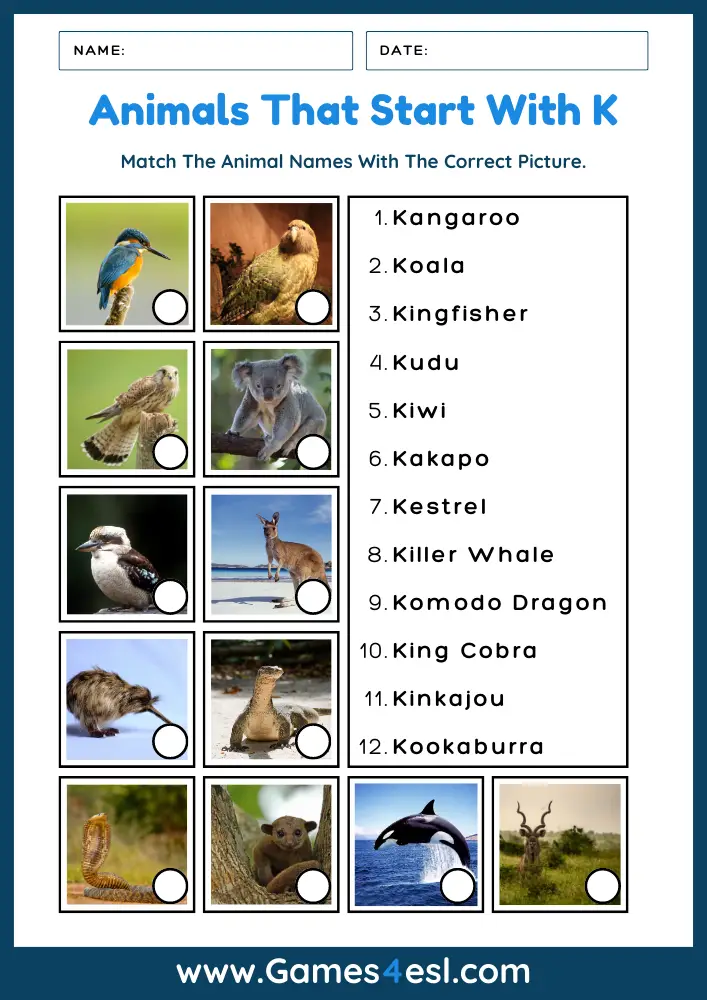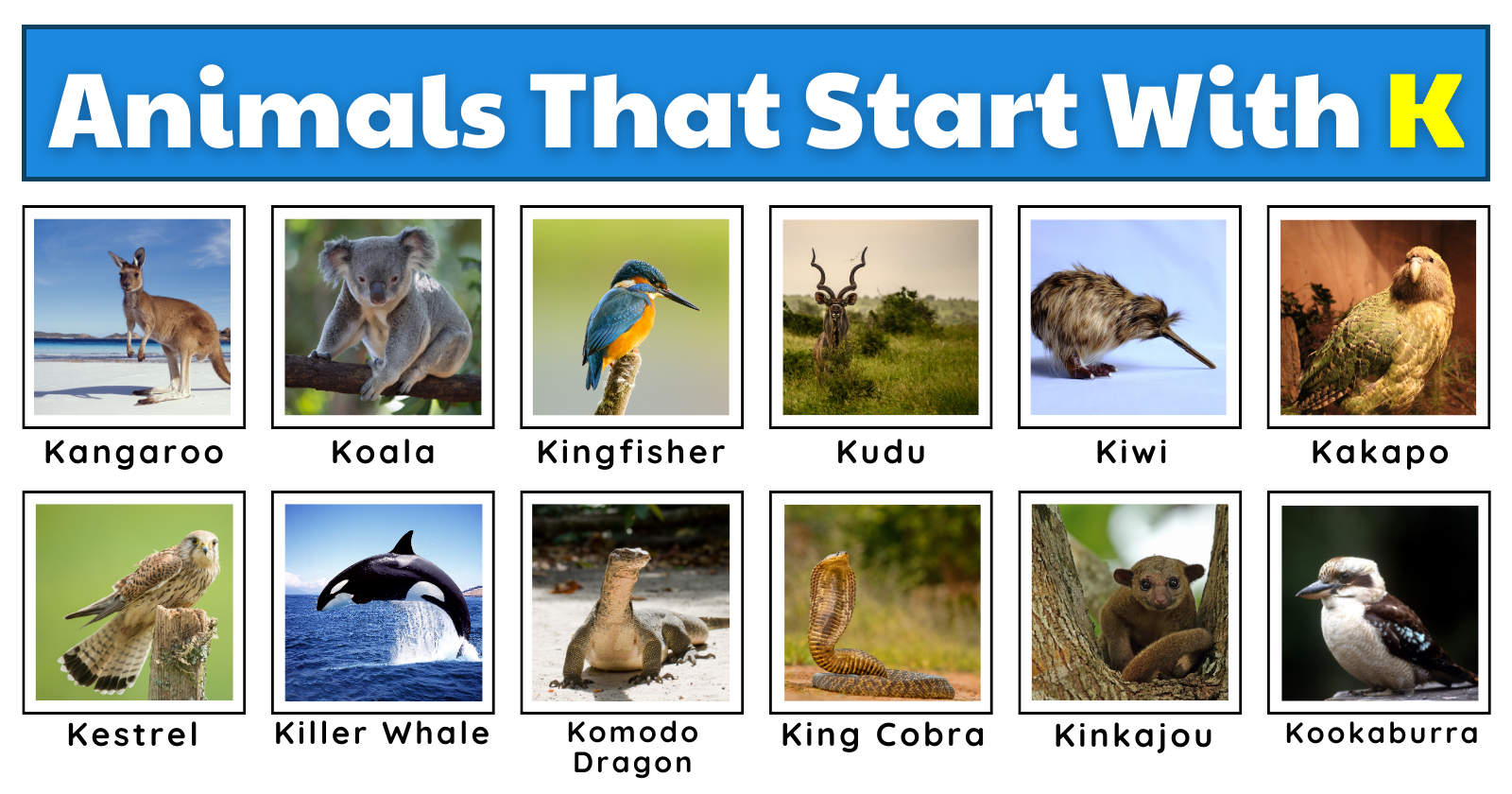Animals That Start With K | List, Fun Facts, And A Free Worksheet!
Learn the names of animals that start with K with this useful vocabulary list. Below you’ll find a list of 50 animals that start with the letter K. We’ve also included some fun facts about each of these animals and a free PDF worksheet to help you learn or teach these animal names.
List Of Animals That Start With K
- Kangaroo
- Koala
- Kingfisher
- Kudu
- Kiwi (bird)
- Kakapo
- Kestrel
- Killer Whale (Orca)
- Komodo Dragon
- King Cobra
- Kinkajou
- Kangaroo Rat
- Krait (snake)
- Katydid (insect)
- Krill (crustacean)
- Koi (fish)
- Kookaburra
- Keel-billed Toucan
- Knifefish
- Kerodon (rodent)
- Klipspringer (antelope)
- King Penguin
- Knysna Turaco (bird)
- Kentucky Warbler (bird)
- Kagu (bird)
- Kermode Bear
- Kea (parrot)
- Kakariki (parrot)
- Kelp Gull
- Kenyan Sand Boa
- Kiang (wild ass)
- Klipdas (Rock Hyrax)
- Kissing Gourami (fish)
- Kite (bird of prey)
- Knob-billed Duck
- Kob (antelope)
- Kokanee Salmon
- Korean Jindo (dog)
- Korat (cat)
- Karakul (sheep)
- Karelian Bear Dog
- Karasugoi (Koi fish variety)
- King Quail
- King Vulture
- Kirk’s Dik-Dik (antelope)
- Kissing Bug (insect)
- Knifejaw (fish)
- Knobbed Porgy (fish)
- Kemp’s Ridley Turtle
- Kirk’s Dik-Dik
Worksheet – Animals Starting With K

This worksheet has a list of animals starting with the letter K, together with pictures. To complete the worksheet, you must match the animal name with the correct animal picture. As always, this worksheet is FREE!
Fun Facts About These Animals Beginning With K
Kangaroo
Kangaroos can’t walk backward and use their tails for balance and support when hopping at high speeds.
Koala
Koalas have fingerprints that are almost identical to human ones. They’re one of the few animals apart from primates to have them.
Kingfisher
Kingfishers are great at fishing because they can see both in air and water due to a special flexible lens in their eyes that adjusts to distorted light.
Kudu
The Kudu, an antelope found in Eastern Africa, has spiraling horns that can grow up to 72 inches long.
Kiwi
The Kiwi bird from New Zealand lays the largest egg in relation to its body size of any species of bird in the world.
Kakapo
The Kakapo is a flightless bird from New Zealand. It’s the world’s heaviest parrot and is also nocturnal.
Kestrel
Kestrels are a type of falcon that can hover in the air even in high winds, often seen on the side of roads looking for prey.
Killer Whale (Orca)
Orcas, or killer whales, are the largest of dolphins and one of the world’s most powerful predators. They’re known for their striking black and white coloring.
Komodo Dragon
Komodo dragons are the largest living lizards in the world. They have a keen sense of smell and can detect carrion from up to 4km away.
King Cobra
The King Cobra is the longest venomous snake in the world, capable of reaching lengths up to 5.5 meters (18 feet).
Kinkajou
Kinkajous, also known as “honey bears,” have long tongues that they use to lap up honey from beehives.
Kangaroo Rat
The Kangaroo Rat never drinks water. It gets all the moisture it needs from the seeds it eats.
Krait
The Krait is one of the most venomous snakes in the world. Its venom is 15 times more deadly than that of a cobra.
Katydid
Katydids hear through their legs. They have ears located on the joints of their front legs.
Krill
Krill are small crustaceans found in every ocean of the world. They are a key part of the aquatic food chain, serving as the main food for animals like whales, seals, and penguins.
Koi
Koi fish are a symbol of love and friendship in Japan, and they can live for a very long time. The oldest known koi lived to be 226 years old!
Kookaburra
The Kookaburra, an Australian bird, is known for its distinct laughing call, which sounds eerily human.
Keel-billed Toucan
The Keel-billed Toucan uses its large, colorful bill to reach for fruit that would otherwise be out of reach.
Knifefish
Knifefish are unique because they can swim both forward and backward.
Kerodon
Kerodons, or rock cavies, are rodents that live in the rocky terrain of northeastern Brazil and are great climbers due to their sharp claws.
Klipspringer
Klipspringers, small antelopes from Africa, have specially adapted hooves that allow them to balance on the tips of their toes on rocky terrain.
King Penguin
King Penguins are the second largest species of penguin, smaller only than the Emperor Penguin. They can dive deeper than any other bird, reaching depths of up to 330 meters (1082 feet).
Knysna Turaco
The Knysna Turaco, a bird from South Africa, has beautiful, bright green feathers that contain actual green pigment – unlike most birds, whose colors result from the reflection and scattering of light.
Kentucky Warbler
Kentucky Warblers are small birds that spend most of their time on or near the ground in dense vegetation, making them difficult to observe despite their loud songs.
Kagu
The Kagu is a bird found only in New Caledonia, known for its bright orange legs and bill and its ‘nasal corns,’ which are unique among birds.
Kermode Bear
The Kermode Bear, also known as the “Spirit Bear,” is a rare subspecies of the American black bear living on the central and north coast of British Columbia, Canada. Approximately 1 in 10 of these bears are white or cream-colored.
Kea
The Kea, a parrot from New Zealand, is known for its intelligence and curiosity, both vital to its survival in a harsh mountain environment. Keas have been observed using tools and solving complex puzzles.
Kakariki
The Kakariki is a parrot species native to New Zealand. The word ‘kakariki’ is Maori for ‘green,’ reflecting this bird’s bright plumage.
Kelp Gull
The Kelp Gull, also known as the Dominican Gull, is the southernmost breeding gull in the world, found in Antarctica and the southern areas of Africa, Australia, and South America.
Kenyan Sand Boa
Kenyan Sand Boas are one of the smallest species of boa in the world. They spend most of their time buried in the sand, waiting for prey to come by.
Kiang
The Kiang is the largest species of wild ass. They live in the rugged terrain of the Tibetan Plateau and are known for their loud braying.
Klipdas
The Klipdas, also known as the Rock Hyrax, has unique ‘sweat’ glands on its back, which it uses to mark its territory.
Kissing Gourami
Kissing Gourami fish are so named because their ‘kissing’ action is not a sign of affection but a way of establishing dominance within their group.
Kite
Kites are birds of prey that are known for their ability to stay still in the air as if they were hanging from a kite string.
Knob-billed Duck
The Knob-billed Duck, also known as the Comb Duck, has a unique knob on its bill that is more prominent in males, especially during the breeding season.
Kob
Kobs are African antelopes that often form large herds, which provide protection from predators. They are known for their spectacular mating displays, where males show off their strength and stamina in long-lasting ‘lekking’ battles.
Kokanee Salmon
The Kokanee Salmon is a landlocked form of the Sockeye Salmon, meaning it spends its entire life in freshwater, which is a unique lifestyle among salmon species.
Korean Jindo
The Korean Jindo is a breed of dog known for its loyalty. In South Korea, it’s a national treasure and has been designated as a natural monument.
Korat
The Korat is a breed of cat native to Thailand. It is considered a symbol of good fortune.
Karakul
The Karakul is a breed of domestic sheep that is known for the quality of its wool, known as ‘Astrakhan’, which is used to make high-quality coats, hats, and other products.
Karelian Bear Dog
The Karelian Bear Dog is a Finnish breed of dog. In its home country, it’s known as Karjalankarhukoira and is used for hunting a variety of animals, especially bears.
Karasugoi
The Karasugoi is a variety of Koi fish. Its name translates from Japanese as ‘black Koi,’ and it is one of the rarest types of Koi.
King Quail
The King Quail is one of the smallest species of ‘true quail’ and is popular in aviculture around the world. Despite their small size, they have complex social structures and communication methods.
King Vulture
The King Vulture has a wingspan of up to 2 meters and is found in Central and South America. It’s a scavenger and has a beak strong enough to tear open tough animal skin.
Kirk’s Dik-Dik
Kirk’s Dik-Diks are one of the smallest antelope species. When threatened, they hide rather than run and rely on their camouflage to protect them.
Kissing Bug
Kissing Bugs get their name from their habit of biting humans on the face or lips while they sleep. However, they’re not as romantic as they sound – they are major vectors of Chagas disease.
Knifejaw
The Knifejaw, a fish native to the western Pacific Ocean, has powerful, beak-like jaws that it uses to crush shellfish.
Knobbed Porgy
The Knobbed Porgy is a species of fish found in the western Atlantic Ocean. They’re named for the bony hump found on the head of adults.
Kemp’s Ridley Turtle
The Kemp’s Ridley Turtle is the rarest species of sea turtle and is critically endangered. They are known for their unique synchronized nesting during daylight, known as ‘arribada’ (arrival in Spanish).
Kirk’s Dik-Dik
Kirk’s Dik-Diks mark their territory with a black substance they secrete from glands in their eyes. This is often seen when they rub their faces on grass stems or tree trunks.
Learn More Animal Names
Animals That Start With A
Animals That Start With B
Animals That Start With C
Animals That Start With D
Animals That Start With E
Animals That Start With F
Animals That Start With G
Animals That Start With H
Animals That Start With I
Animals That Start With J
Animals That Start With K
Animals That Start With L
Animals That Start With M
Animals That Start With N
Animals That Start With O
Animals That Start With P
Animals That Start With Q
Animals That Start With R
Animals That Start With S
Animals That Start With T
Animals That Start With U
Animals That Start With V
Animals That Start With W
Animals That Start With X
Animals That Start With Y
Animals That Start With Z


